
Concetta Rosa Maria Franconero , known professionally as Connie Francis, is an American pop singer, actress, and top-charting female vocalist of the late 1950s and early 1960s. She is estimated to have sold more than 100 million records worldwide.
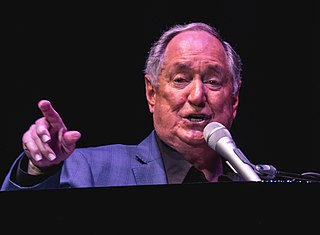
Neil Sedaka is an American singer, songwriter and pianist. Since his music career began in 1957, he has sold millions of records worldwide and has written or co-written over 500 songs for himself and other artists, collaborating mostly with lyricists Howard "Howie" Greenfield and Phil Cody.

Howard Greenfield was an American lyricist and songwriter, who for several years in the 1960s worked out of the famous Brill Building. He is best known for his successful songwriting collaborations, including one with Neil Sedaka from the late 1950s to the mid-1970s, and near-simultaneous songwriting partnerships with Jack Keller and Helen Miller throughout most of the 1960s.

"Who's Sorry Now?" is a popular song with music written by Ted Snyder and lyrics by Bert Kalmar and Harry Ruby. It was published in 1923, when Isham Jones had a major hit with it. Other popular versions in 1923 were by Marion Harris, Original Memphis Five, Lewis James, and Irving Kaufman.

"Breaking Up Is Hard to Do" is a song recorded by Neil Sedaka, co-written by Sedaka and Howard Greenfield. Sedaka recorded this song twice, in 1962 and 1975, in two significantly different arrangements, and it is considered to be his signature song. Between 1970 and 1975, it was a top-40 hit three separate times for three separate artists: Lenny Welch, The Partridge Family and Sedaka's second version.
"Don't Break the Heart That Loves You" is an American song written by Benny Davis and Murray Mencher. The song was a success for two artists in two different genres: Connie Francis in the pop field in 1962 and Margo Smith as a country version in 1978.

"Love Will Keep Us Together" is a song written by Neil Sedaka and Howard Greenfield. It was first recorded by Sedaka in 1973. The brother-sister duo Mac and Katie Kissoon recorded their version in 1973. American pop duo Captain & Tennille covered it in 1975, with instrumental backing almost entirely by “Captain” Daryl Dragon, with the exception of drums played by Hal Blaine; their version became a worldwide hit.
"Carolina Moon" is a popular song, written by Joe Burke and Benny Davis. Written in 1924, the song was first recorded in 1928 by American crooner Gene Austin whose version charted for 14 weeks, seven of them at #1.
"If My Pillow Could Talk" was written by Jimmy Steward, Jr. of the Ravens and Bob Mosley, and was a hit single for Connie Francis.
"Happy Days and Lonely Nights" is a torch song written by Billy Rose and Fred Fisher, first recorded by The Harmony Brothers on May 18, 1928. The song was successfully revived in the 1950s in the US by the Fontane Sisters and in the UK most successfully by Ruby Murray.

"Stupid Cupid" is a song written by Howard Greenfield and Neil Sedaka which became a hit for Connie Francis in 1958.
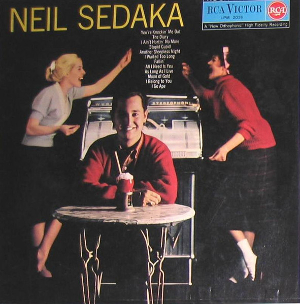
Rock with Neil Sedaka or just Neil Sedaka is the first major solo album of Neil Sedaka released in 1959 after two 1958 albums under the titles Neil Sedaka and The Tokens and Neil Sedaka and The Tokens and Coins. The album was released by RCA Victor and was produced by Al Nevins. The album contains 12 songs, all of them co-written by Sedaka and his friend Howard Greenfield. Two of the songs became successful singles for Sedaka from the album, namely "The Diary", his debut single that was a hit, reaching No. 14 on the US Billboard charts, and "I Go Ape", a single that was relatively successful in the United States reaching No. 42, but did far better in the UK Singles Chart, making it up to No. 9 and his debut single in the United Kingdom.

The Other Side of Me is the thirty-fifth studio album by American pop singer Andy Williams, released in the summer of 1975 by Columbia Records and including the 1973 recording of "Solitaire" from his album of the same name alongside 10 original recordings, four of which were also by "Solitaire" composer Neil Sedaka. After unsuccessful attempts to leave behind the formulaic album genre of easy listening covers of pop hits, The Other Side of Me offered a compromise by filling half of the sides with material that was popularized by other artists and the other half with either new or obscure selections.

My Thanks to You is a studio album recorded by American entertainer Connie Francis. The album features songs which had been popular on both sides of the Atlantic between the 1920s and the 1940s. It was recorded March 4–6, 1959, at EMI's famous Abbey Road Studios in London.
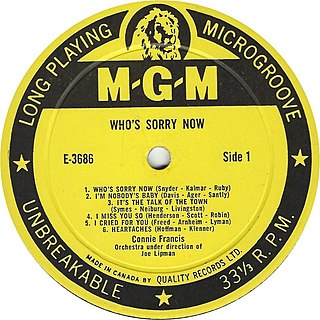
Who's Sorry Now? is the first studio album recorded by U. S. Entertainer Connie Francis.

The Very Best of Andy Williams is a compilation album by American pop singer Andy Williams that was released in the UK on October 5th, 2009. A note from Williams inside the CD booklet explains that the album "was put together to coincide with my memoir Moon River and Me, published by Orion Press. It includes many of the songs that you made hits. I truly appreciate that, and I hope you enjoy the songs we selected for this CD." This compilation includes recordings that either charted in the UK but not in the US or charted much higher on the UK singles chart than they did on the Billboard Hot 100 in the US. It entered the UK albums chart on October 17, 2009, and reached number 10 during its six weeks there.
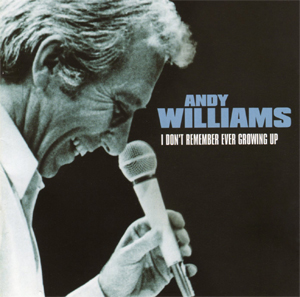
I Don't Remember Ever Growing Up is the forty-third and final studio album by American pop singer Andy Williams, released in the UK by the Demon Music Group in 2007. In the liner notes of the album Williams writes, "Over the past few years I have come across songs that I really wanted to record. I picked 13 of my favorites and set out to make a new record." While the title track is the only new song, the other 12 selections were chart hits for other artists or, as is the case with "Desperado" by the Eagles, received critical acclaim without having been released as a single.

"Next Door to an Angel" is a rock and pop song written by Neil Sedaka and Howard Greenfield and recorded by Neil Sedaka in 1962. It was issued by RCA Victor Records. It reached No. 5 on the Billboard Hot 100 in late 1962. "Next Door to an Angel" also went to No. 19 on the Hot R&B Singles chart. It was Sedaka's last appearance on the American Top 10 until "Laughter in the Rain" in late 1974.

"Where the Boys Are" is a song written by Neil Sedaka and Howard Greenfield for, and first recorded by, Connie Francis as the title track of the 1960 movie by the same name in which she was co-starring.
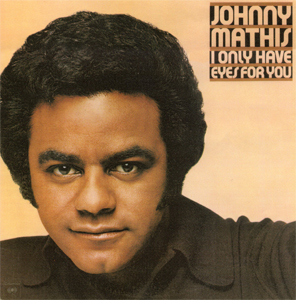
I Only Have Eyes for You is an album by American pop singer Johnny Mathis that was released on May 10, 1976, by Columbia Records and included two new songs, "Yellow Roses on Her Gown" and "Ooh What We Do", which was written specifically for him, as well as a contemporary arrangement of the 1934 title track that foreshadowed his recordings of standards that incorporated a disco beat a few years later.













